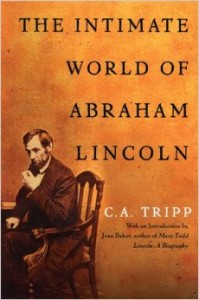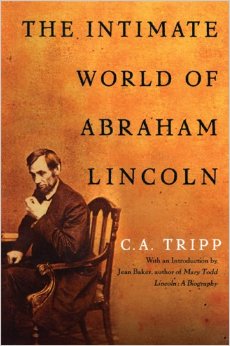 The Intimate World of Abraham Lincoln
The Intimate World of Abraham Lincoln
by C. A. Tripp
Free Press. 384 pages, $27.
SOME DUST has begun to settle on C. A. Tripp’s controversial new book, The Intimate World of Abraham Lincoln. For several weeks after the book’s publication last January, the media swirled with news reports, interviews, editorial cartoons, online forums, and even satires. The reviews have been surprisingly positive—but I would like to suggest that they have been positive in problematic ways.
In The Intimate World of Abraham Lincoln, Tripp marshals historical evidence, psychological theories, and simple conjecture to support his argument that America’s sixteenth president experienced—and acted on—lifelong feelings of same-sex desire. Not the sort of claim one might expect would be well received by the American public—and, predictably, in some corners, it has not been. Bill O’Reilly, the Illinois Family Institute, and The New York Post all dismissed the book; “nah, forget about it,” sneered U.S. News and World Report. Tripp’s former collaborator Philip Nobile turned to the less-than-respectable pages of The Weekly Standard to lodge his accusations of fraud and plagiarism. Some academic historians weighed in against it. Lincoln scholar Harold Holzer called the book “an embarrassment to serious historical discussion,” and Harvard historian David Donald went so far as to launch a pre-emptive strike against Tripp’s ongoing research in his 2003 book “We Are Lincoln Men”: Abraham Lincoln and His Friends. Folks like this made up their minds about the book long before they read it; they have responded to any assertion of Lincoln’s homosexuality as one treats a fart in church: stiffen the backbone, think about Jesus, and sing extra loud in case another one’s coming.
By contrast, there have been enthusiasts. Andrew Sullivan, writing first in The New Republic Online and later in The Advocate, found the book “important” and concluded that “Lincoln was, if not 100 percent gay, then at least gay with a touch of bisexuality.” “[W]hen you review all the many pieces of the Lincoln emotional-sexual puzzle,” he writes, “the homosexual dimension gets harder and harder to ignore.” Tripp has found favor in academe as well; Civil War historian Jean Baker, biographer of Abe’s wife Mary Todd Lincoln, found the book “thought-provoking, richly researched” and “intelligently argued” enough to convince her that “Lincoln was bisexual.” Plenty of readers, clearly, have been convinced by Tripp’s revelations.
The most interesting responses to The Intimate World of Abraham Lincoln have been the paradoxical ones: reviewers who dislike the book but seem nonetheless to accept its basic claim; others who accept the argument but then reject its implications. In the first category, one might put Jean Baker: “while Tripp may be wrong in his interpretation of some particulars, he may still be right on the larger question.” Or the conservative writer Richard Brookhiser, who peppered the New York Times Book Review with words such as “worthless” and “erratic,” but still seemed to have bought at least some of it: “on the evidence before us, Lincoln loved men, at least some of whom loved him back.”
The second category—those who accept the argument but not its implications—are somewhat more difficult to characterize. In the pages of Vanity Fair, Gore Vidal weighed in with an enthusiastic reading, finding fascination not in “the many details about Lincoln’s homosexual side as the fact that he had, marriage to one side, so very little heterosexual side.” But, Vidal wants to know, “what did sex have to do with his conduct of the Civil War, the emancipation of slaves?” Princeton historian Christine Stansell has written so far the most thoughtful reflection in the mainstream media in a lengthy review in The New Republic. “[T]he virtue of this little book is to get you wondering,” she begins, commencing a methodical scrutiny of the evidence, with critical jabs at Tripp’s misogyny and his habit of “fall[ing]back on supposed eternal verities about homosexuality,” and a careful placement of Tripp’s claims within scholarly debates (which he mostly ignored) on the history of sexuality. “[A] dossier of ambiguities … worth considering,” she intones. But then she undermines much of her insightfulness with the conclusion: “Finally we have only conjecture amplified by conjecture; and finally it doesn’t matter much.”
Doesn’t matter much? Of course it does. The question should not be whether it matters, but how. Tripp himself was vague on the implications: not “a single slave was freed sooner—or kept in chains longer,” he concluded, because of Lincoln’s sexual desires. And he’s right: an interpretation of Lincoln as a taboo-breaker in the bedroom and the White House would be a shoddy oversimplification, a mockery of history, biography, and psychology all at once. Nor should readers approach Lincoln, as has activist Larry Kramer, in search of a “role model.” “It is interesting,” one skeptical participant in an online discussion forum noted, “that there is a need in the gay community to try and fit history to fit them.” “Self-esteem” is all well and good in a northern California healing-crystal store but should have no place in the serious investigation of the past. The Boston Globe’s conservative columnist Cathy Young didn’t get much right in her column (which was not so much a review, as she revealed no evidence of having read the book), but she did hit the nail on the head when she argued that “subordinating history to identity politics is never a good idea.”
Still, it matters. Suggesting that Lincoln’s most intimate desires are irrelevant is an attempt to explain Lincoln away rather than to explain him—something more pernicious than any invocation of words like “preposterous” or “vulgar” on a right-wing talk show. Brookhiser hides behind history rather than confronting it, saying that the public face of the president is “the Lincoln that matters” while “[t]he rest is biography.” Michael F. Bishop, in The Washington Post, insists that “[d]welling on matters of the flesh will bring us no closer to Lincoln’s soul.” Hostility here masquerades as a cool indifference or hip tolerance.
What are the “so what” critics actually against? Some may reject the idea that sexuality makes a difference in our public politics—a rather puzzling claim in a post-Monica era. Others are simply baffled by the forms and histories of bisexuality, an aspect of the book’s reception that awaits deeper analysis. But what many doubt is the notion that same-sex desire has a history. The affection that Lincoln felt and expressed toward men—which he would not have called “homosexuality,” nor recognized as such if a time-traveler returned to explain it to him—is an emotion that no longer exists today. But whatever it was, it stands now as a challenge to orthodoxies of timelessness (whether fostered by the religious right or identity politicians), and as a testament to the power of human desire to shape and reshape our societies, and ourselves.
Christopher Capozzola teaches American history at the Massachusetts Institute of Technology. His essay “The Gay Lincoln Controversy” appeared in The Boston Globe in January.






